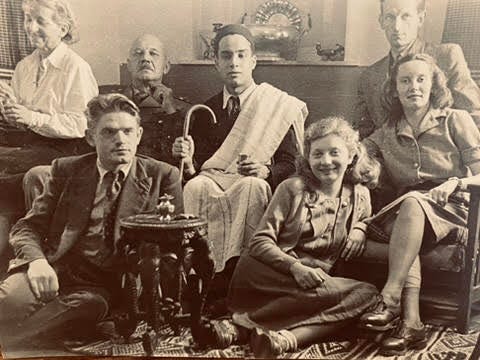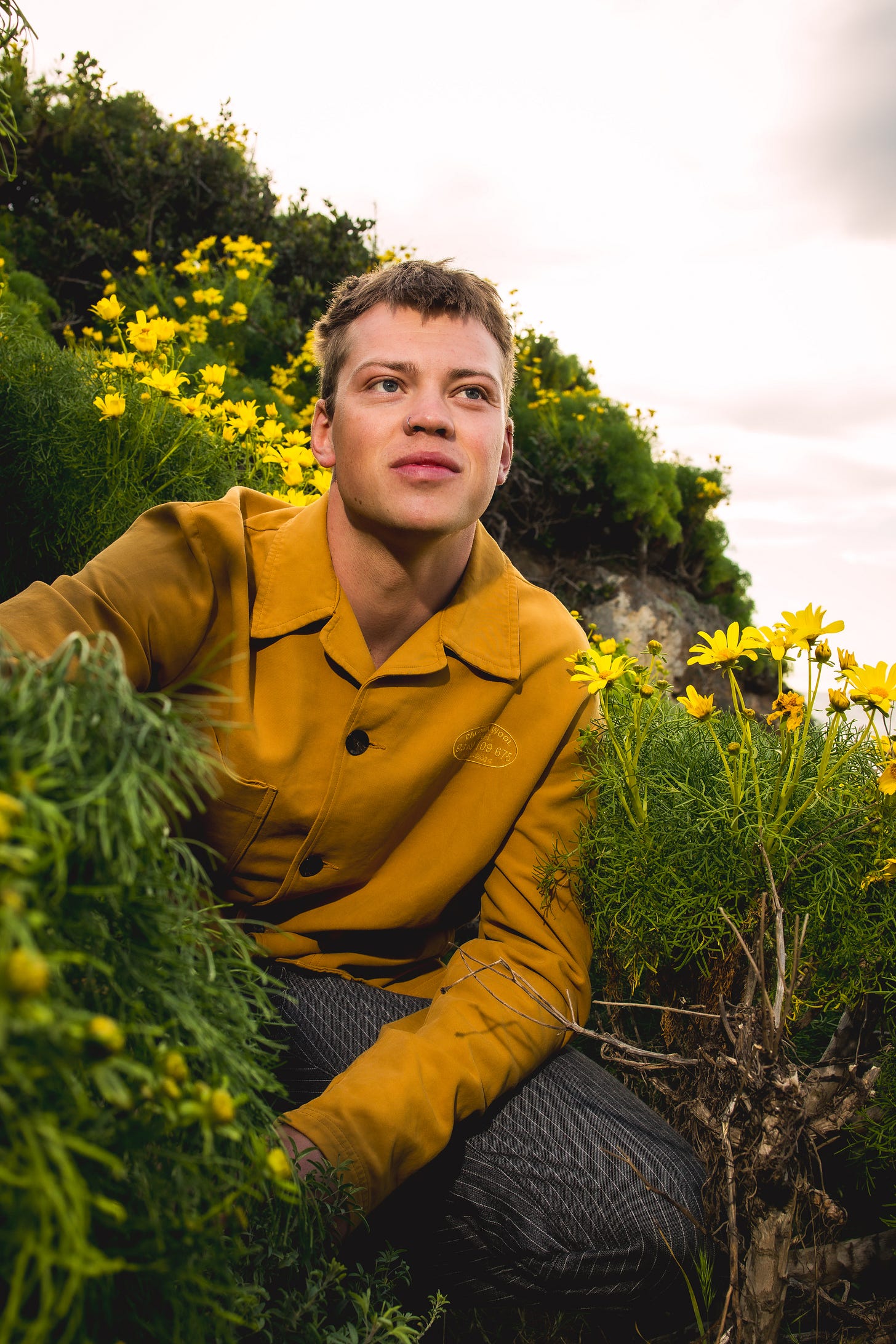BACKSTORY
Place: Benghazi, Libya. Time: 1946-1954. A Polish family in exile.
BACKSTORY is a collection of imagined conversations with characters that stretch from one project to the next. From memoir to novel. From Poland during the Second World War to Libya, in the years between 1946-1957. Drawn from fact and shaped by fiction, these characters occupy a generation of Europeans that fell between the cracks. Stateless and political refugees, this family of Poles find themselves living together in Benghazi’s Villa Derna, each one grappling with a new life at the end of the war. The first two monologues presented here are of Anna Polakovska, wife of Count Tarnowski and Otto Herberth, a young Transylvanian Saxon, who works as a tailor for the Polish family.
The monologues are read by actors Laurel Lefkow and Rio Rasch.
ANNA, read by Laurel Lefkow
Anna sits in a weathered arm chair, placed in the middle of an olive grove at some distance from Villa Derna. A table rests to her right. She is in her early 40s and wears an elegant wide-brim hat. She is at ease here, in this olive grove, but there is a vulnerability that one sees in her eyes. A watchfulness that is always present.
Benghazi, Libya 1946
My name is Anna Ludmilla Polakovska. I am from Poland. I have two children. My son, Jan, who is twenty-four, and my daughter, Maya, five. I work here, in Benghazi. I am a nurse at the British Military Hospital. I was raised in a town near the Izerskie Mountains.
She gestures to the desert, as if she might transform her surroundings.
Very green. Forests and rivers.
Well, I first met Otto at Camp 116. Do you know it? It is the old POW Camp used by the Italians. I arrived at the Camp with Sergeant Harcourt. He insisted on coming Otto was a former prisoner of war. There were quite a few soldiers there that day. It’s not uncommon. They often put up there when they arrive. There’s still running water. A few of the barracks are in good shape. And Otto came by ship, from Greece. When I found him, his leg was severely infected. The infection had spread and amputation was the only possible solution. And, yes, I spent quite a bit of time with him during the recuperation period. My training, you see, is in trauma. He was at the hospital for over two months. But he was a wonderful patient. Kind. Brave. You know, it’s not an easy thing to lose a leg. And he’s almost the same age as my son, Jan. Sometimes he almost looks like Jan. I’m sure my husband has told you we haven’t seen Jan for four, almost five years.
Distressed, she pauses.
At the time that the decision about Jan was made, my husband and I discussed the options. Finally, I agreed with my husband. We knew what awaited us. We knew the strength of the German army. We knew–-we did--what would come. My husband had already made all the arrangements to send him to Jan to his cousin in South America. Tickets, papers, false identity. He arranged everything. He even enrolled him in a junior college. And, yes.
Finally, I agreed to send him.
She hesitates…
Yes, I agreed. I accepted.
The night before Jan left, we sat together in the shelter. I was looking for him all over. It was the night before we were to be separated and I found him there, alone, in the dark. We hardly spoke that night. I remember, I sang to him. Oh, songs from long ago, I suppose. Childhood songs. And we heard the planes roaring overhead and I would like to think that he realized, he understood, what we were trying to do. That we wanted to save his life.
She carefully measures her words…
But it was a mistake. You see, every aspect of our society was conditioned on joining the Resistance. And Jan wanted to fight. He felt he was a traitor by not fighting. You can understand, I think. We were a country at war, a country occupied and with young people fighting. And there were so many Jan’s age….it was his right to defend his country, his obligation.
She pauses to look out towards the desert once more.
We paid the price.
OTTO, read by Rio Rasch
Beloved Oma,
I am writing again to the same address in Hungary. I was told these letters will find you even if you have left or they have resettled you. I say this in the hope that you have long been moved from the dismal place I left you. I hope and pray that the couple Florczak are still with you.
Dearest, did you receive my last letter telling you about my injury? Rest assured, all that is behind me now. I felt it was my duty to give you a full appraisal of my health. At the hospital, they informed me they would send word to my next of kin about my leg. I know this must have come as a shock to you.
Let me tell you, your grandson has the most beautiful new leg made from willow-wood and metal. The wood reminds me of the trees by the side of our house at home. As for walking, I am an expert now. My friend Anna, about whom I have written so many letters has helped me to recuperate. I walk easily. A champion’s walk!
You would never know I have only one leg.
For now, dear Oma, I am still living in the house owned by the family of Poles. The address is 42 Via Torelli, Benghazi. I am proud to say, that I am the tailor for this family and for many of their friends who come to see me for fittings.
Close your eyes, Oma. I will describe my room to you. Think of the windows in Frau Walthar’s house. Do you remember, how large they were, opening onto the south side of the garden? That is how it is here, Oma, the windows in my room. Only here, I can see the blue ribbon that is the sea.
Imagine. I am that close.
The color of the water changes with the light, sometimes it is an iron blue, filled with grey or green like Lake Colibitsa. At other times, it is the palest, softest blue, filled with reflecting clouds. And the salt in the air. Oma, like the time we went to the Black Sea. It’s that smell exactly. And it fills my room with the breeze.
Keep your eyes closed, Oma, and now I will tell you more.
In my room, I have a comfortable bed, a lamp, a small bookshelf and in the center of my room, is a table on which sits a sewing machine—an Italian Necchi! I have a basket-full of the most beautiful threads: saffron, melon, ochre. You see, Oma, I want you to know that I am fine. I have already made a cloak for Anna from a piece of raw silk. It was not easy to do the cutting as my scissors are nothing like what we had at home but I have managed. In the hospital, with the same sewing machine I made skirts for the nurses and a hat for the young Libyan boy who cleaned the floors. Your grandson has been hard at work. I am forever your schneidermeister.
As I write, Anna is awaiting the arrival of her son from Europe. She has not seen him since before the war. I do not wish to be a burden and so I have begun to look for somewhere else to live. You must not worry because I am assured a place--somewhere. By now, I have many friends, local merchants in the market who sell fabric and who have become my allies. I have already seen one room and will see many more, I am sure. Anna speaks so often of her son. Sometimes she even mistakes me for him and calls me by his name. It’s alright. I don’t mind so much. (pause) As long as I can sew, I am well.
With every stitch, I think of you, Oma. My hands are your hands.
Your faithful grandson, Otto.







Alex, my eyes closed and my head dropped into my hands in anguish, listening to Laurel read Anna. Her soft vocals delivered such sharp pain, with little chance of relief. Rio gave Otto a beautiful brave tone, along with his longing for home and family. Your words brought their migrant lives straight into my heart, and I will not soon forget their intensity. Gratefully yours, Ellen Lent